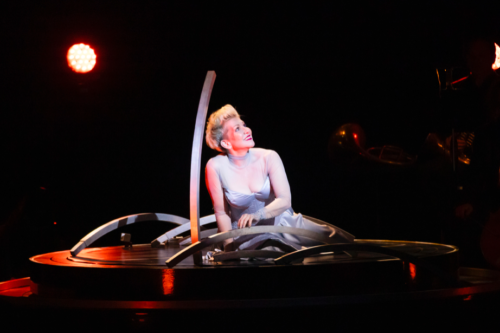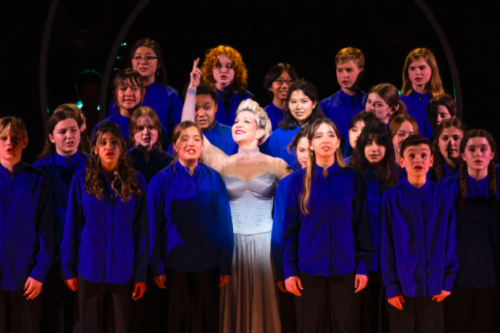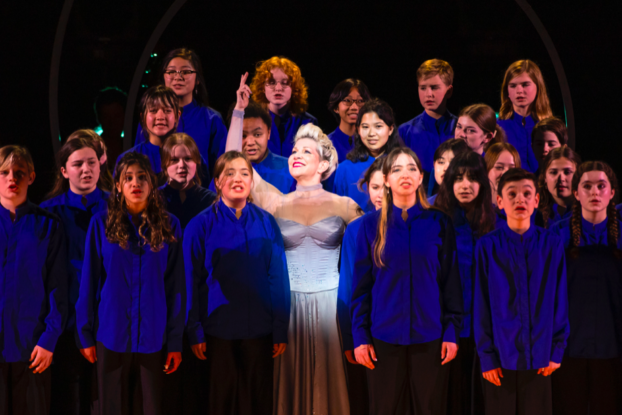 United States Various: Joyce DiDonato (mezzo-soprano and executive producer), Il Pomo d’Oro / Zefira Valova (concertmaster). Presented by Cal Performances, Zellerbach Hall, University of California Berkeley, 21.1.2023. (HS)
United States Various: Joyce DiDonato (mezzo-soprano and executive producer), Il Pomo d’Oro / Zefira Valova (concertmaster). Presented by Cal Performances, Zellerbach Hall, University of California Berkeley, 21.1.2023. (HS)

Ives – The Unanswered Question\
Rachel Portman – ‘The First Morning of the World’
Mahler – ‘Ich atmet’ einen linden Duft’ and ‘Ich bin der Welt abhanden gekommen’ from Rückert-Lieder
Uccellini – Sinfonia terza (a cinque stromenti), Op.7
Marini – ‘Con le stelle in ciel che mai’ from Scherzi e canzonette, Op.5 No.3
Mysliveček – ‘Toglierò le sponde al mare’ from Adamo ed Eva
Copland – ‘Nature, the gentlest mother’ from 8 Poems of Emily Dickinson
Valentini – Sonata in G Minor Enharmonic
Cavalli – ‘Pianti ombrosi’ from La Calisto
Gluck – ‘Dance of the Furies’ from Orfeo ed Euridice; ‘Misera, dove son! …Ah! non son Io che parlo’ from Ezio
Handel – ‘As with rosy steps the morn’ from Theodora
Any performance by the extraordinary mezzo-soprano Joyce DiDonato pretty much guarantees great singing, along with a large helping of heart. EDEN, her latest project, adds an extra layer of visual textures to a compelling theme to enhance what might have been an extraordinary recital without it.
The music spans five centuries, from early-seventeenth-century Monteverdi to a piece written in 2021 by Rachel Portman especially for EDEN that explores our human connection to nature. It also suggests that we better pay more attention before it is too late.
Without being preachy, the program offers the eloquence of gorgeous, emotionally direct music, and dresses the stage with a simple but absorbing kinetic sculpture that fits metallic arcs into two circles that rotate around a low circular platform. The 39-piece Il Pomo d’Oro chamber orchestra surrounds this dais. Lighting by John Torres (associated with Robert Wilson’s operatic productions) and staging by Paris-based opera director Marie Lambert-Le Bihan make great use of DiDonato’s striking figure, clad in a light blue corset and a flowing, gauzy skirt.
DiDonato is not new to expanding on a vocal recital. Her ‘In War & Peace’ established the template, taking the show on tour in 2017-2018 to delve into operatic arias about battles to the death, and how music can soothe the savage (and savaged) soul. ‘EDEN’, on its multi-year tour, had its twenty-third performance Saturday at Zellerbach Hall at the University of California Berkeley. It applies musical balm to the damage we humans seem to be doing to the natural world around us.
Beginning dramatically in darkness, a single spotlight illuminating concertmaster Zefira Valova, the softly pulsing opening chords of Charles Ives’ ambiguous The Unanswered Question, sung wordlessly by DiDonato instead of by Ives’ solo trumpet, floated from a side balcony, intoning the question without words, the singer moving closer to the stage with each repetition.
‘The First Morning of the World’, with words by opera librettist Gene Scheer to Rachel Portman’s attractive music, followed without pause. The message, conveyed gently by the music, is that we tend to use land as a resource rather than trying to be part of it, and asks how we can recover an untouched paradise.
That led seamlessly to Gustav Mahler’s aromatic setting of ‘Ich atmet’ einen linden Duft’ from Rückert-Lieder, which literally means ‘I breathed a delicate scent’. It plays on the similarity of linden (delicate) and Linden (the tree), whose blossoms create the aforementioned fragrance.
The next few numbers, also without pause for applause, started with two seventeenth-century works: a sinfonia by the Modena composer Marco Uccellini (whose name means ‘little birds’), and the lively song ‘Con le stelle in ciel che mai’ from Biagio Marini’s Scherzi e canzonette. Next came ‘Toglierò le sponde al mare’ from the Czech Baroque composer Josef Mysliveček’s Adamo ed Eva and, returning to our current era, ‘Nature, the gentlest mother’, the first song in Aaron Copland’s 8 Poems of Emily Dickinson. All were delivered with distinctive charm and clarity by soloist and orchestra.
As she sang, DiDonato assembled the several metallic arcs into the double-ring sculpture, which, with shadings of light as the circles rotated on the dais, framed each piece with a series of differing looks.
Two works from composers associated with Monteverdi followed – the Sonata in G Minor Enharmonic by Giovanni Valentini, for an instrumental break, and a sinuous aria, ‘Pianti ombrosi’ from Francesco Cavalli’s La Calisto, an ode to shade-giving plants.
Gluck’s famous ‘Dance of the Furies’ from Orfeo ed Euridice served as an instrumental prelude to ‘Misera, dove son! …Ah! Non son Io che parlo’ from the composer’s earlier Ezio. From Handel’s oratorio Theodora, ‘As with rosy steps the morn’ brimmed with nature metaphors, setting up an absolutely ravishing finale – Mahler’s elegiac ‘Ich bin der Welt abhanden gekommen’ from Rückert-Lieder.

As a sort of extended encore, DiDonato brought out a children’s chorus to demonstrate a project concurrent with the EDEN tour. At each stop, the singer has engaged with a children’s chorus, partly to get the younger generation to discover the joys and rewards of making music together, but also to encourage them to create their own music by writing their own songs.
In Berkeley, DiDonato worked with the Piedmont East Bay Children’s Choir, which delivered with gusto the rousing ‘Seeds of Hope’, composed by the Children of the Canterbury Choir in England on one of the tour’s first stops. The choir also sang ‘Morgengesang’, a charming Danish song about the beauty of the sunrise by Danish composer Niels Wilhelm Gade. The student conductor was Lauren Brenner.
As a final encore, DiDonato and the orchestra sent the audience off into the cool, clear evening with a heart-stopping single-verse rendering of Handel’s ode to a tree, ‘Ombra mai fù’ from Xerxes. On their way out, audience members received small, coaster-like cards imbedded with chamomile seeds ready for planting.
Harvey Steiman
